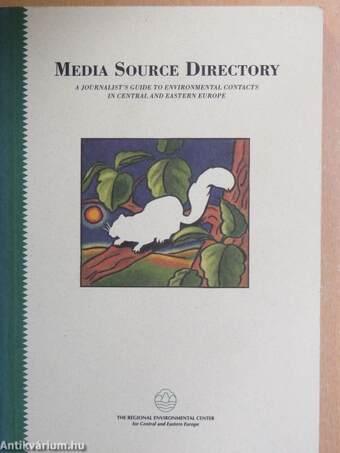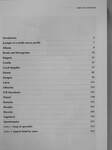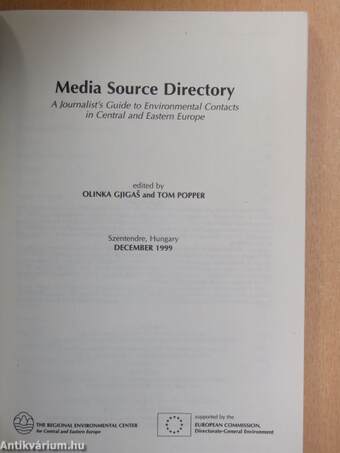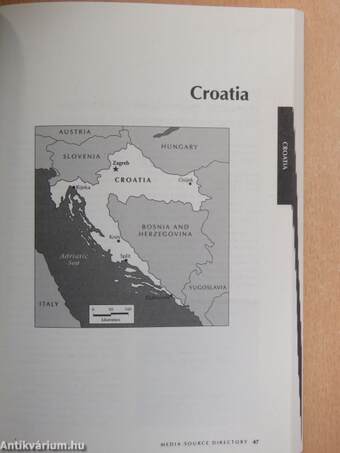1.067.053
kiadvánnyal nyújtjuk Magyarország legnagyobb antikvár könyv-kínálatát

VISSZA
A TETEJÉRE
JAVASLATOKÉszre-
vételek
Media Source Directory
A Journalist's Guide to Environmental Contacts in Central and Eastern Europe
| Kiadó: | Regional Environmental Center for Central and Eastern Europe |
|---|---|
| Kiadás helye: | Budapest |
| Kiadás éve: | |
| Kötés típusa: | Ragasztott papírkötés |
| Oldalszám: | 220 oldal |
| Sorozatcím: | |
| Kötetszám: | |
| Nyelv: | Angol |
| Méret: | 21 cm x 15 cm |
| ISBN: | 963-8454-74-1 |
| Megjegyzés: | Fekete-fehér térképekkel. |
naponta értesítjük a beérkező friss
kiadványokról
naponta értesítjük a beérkező friss
kiadványokról
Előszó
TovábbFülszöveg
The Regional Environmental Center for Central and Eastern Europe (REC) is a non-partisan, non-advocacy, not-for-profit
organisation with a mission to assist in solving environmental problems in Central and Eastern Europe (CEE). The Center fulfils this
mission by encouraging cooperation among non-governmental organisations, governments, businesses and other environmental stake-holders, by supporting the free exchange of information and by promoting public participation in environmental decision-making.
The rec was established in 1990 by the United States, the European Commission and Hungary. Today, the rec ís legally based on a Charter signed by the governments of 25 countries and the european Commission, and on an International Agreement with the Government of Hungary. The rec has its headquarters in Szentendre, Hungary, and Local Offices in each of rrs 15 beneficiary cee countries, which are: Albania, bosnia and herzegovina, bulgaria, Croatia, czech Republic, Estonia, Hungary,... Tovább
Fülszöveg
The Regional Environmental Center for Central and Eastern Europe (REC) is a non-partisan, non-advocacy, not-for-profit
organisation with a mission to assist in solving environmental problems in Central and Eastern Europe (CEE). The Center fulfils this
mission by encouraging cooperation among non-governmental organisations, governments, businesses and other environmental stake-holders, by supporting the free exchange of information and by promoting public participation in environmental decision-making.
The rec was established in 1990 by the United States, the European Commission and Hungary. Today, the rec ís legally based on a Charter signed by the governments of 25 countries and the european Commission, and on an International Agreement with the Government of Hungary. The rec has its headquarters in Szentendre, Hungary, and Local Offices in each of rrs 15 beneficiary cee countries, which are: Albania, bosnia and herzegovina, bulgaria, Croatia, czech Republic, Estonia, Hungary, Latvia, Lithuania, FYR Macedónia, Poland, Romania, Slovakia, Slovenia and Yugoslavia.
Recent donors are the European Commission and the governments of the United States, Japan, Austria, Canada, Czech Republic, Croatia, Denmark, Finland, France, Germany, Hungary, the Netherlands, Norway, Slovakia, Switzerland and the United Kingdom, as well as
other inter-governmental and private institutions. Vissza
Témakörök
- Művészetek > Rádió-TV-újságírás
- Idegennyelv > Idegennyelvű könyvek > Angol > Művészetek > Egyéb
- Idegennyelv > Idegennyelvű könyvek > Angol > Természettudományok > Biológia
- Természettudomány > Biológia > Ökológia, környezetvédelem > Környezetvédelem > Mozgalmak, társaságok
- Természettudomány > Biológia > Ökológia, környezetvédelem > Kézikönyv
- Természettudomány > Biológia > Ökológia, környezetvédelem > Idegennyelvű
- Idegennyelv > Idegennyelvű könyvek > Angol















